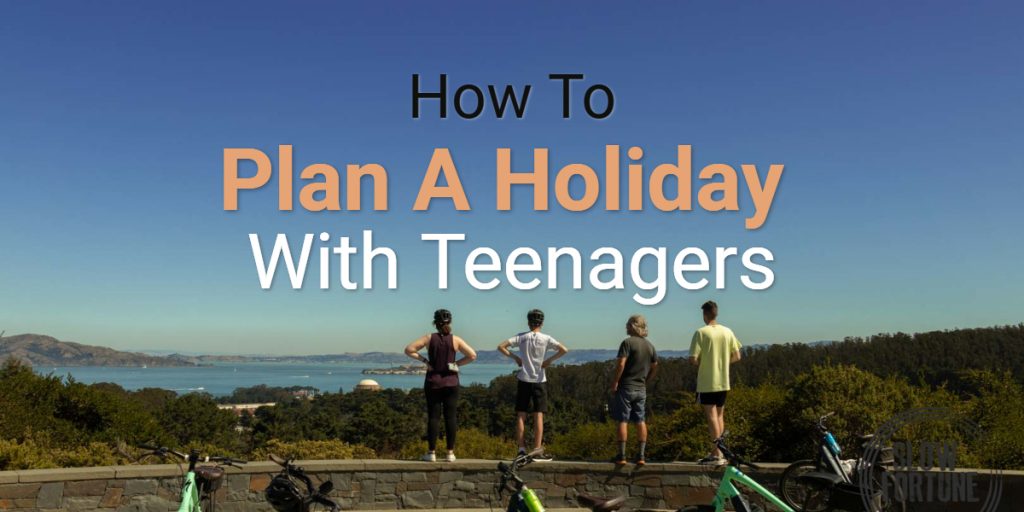
How to plan a holiday with Teenagers
Are you faced with the prospect of travelling with your family but you’re not sure how to plan a holiday with teenagers? I’ve been on two overseas holidays with my teenagers over the past three years and I can happily say I’ve learnt a lot – both good and bad – about holidaying with teens.
In this article, you’ll learn how I plan a holiday with teenagers and we’ll look at what works and what doesn’t.
Deciding Where to go?
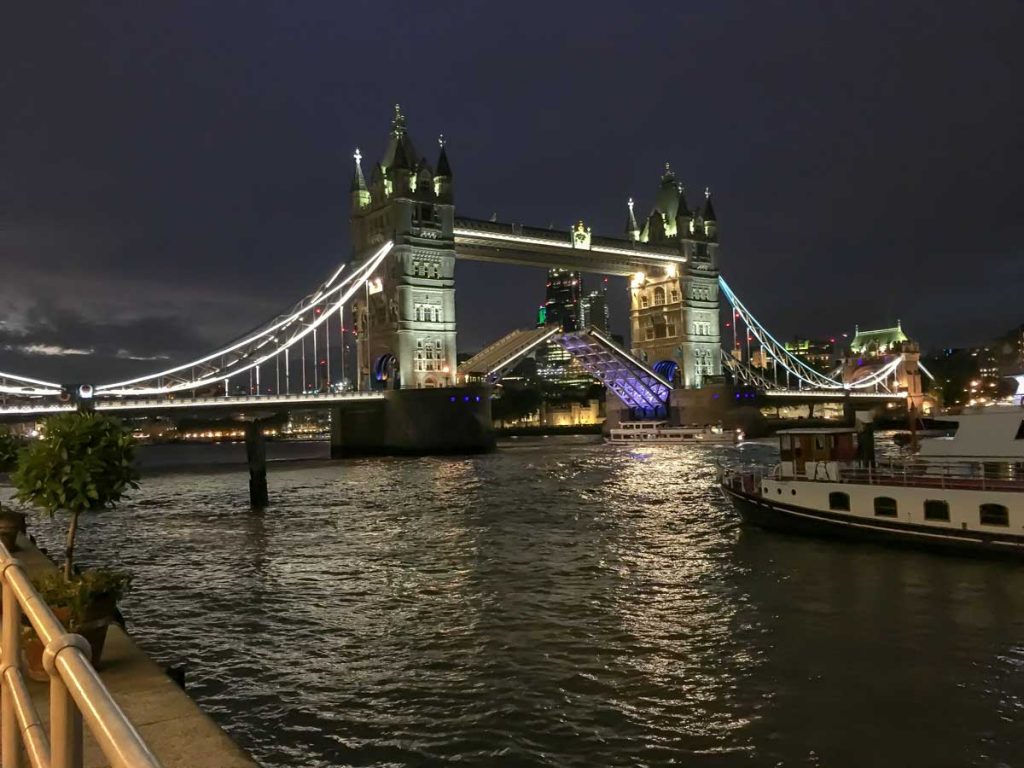
Tower Bridge in London. We planned to have dinner at a restaurant near the bridge and we knew the bridge would open soon after we’d finished dinner.
Our first major overseas holiday was to Europe. We spent time in London, Paris, Normandy, the French alps and finally the Rhine Valley before returning to Australia with a couple of days stopover in Dubai.
This past year we went to the US and spent time in California (San Francisco, Yosemite and Los Angeles), Washington DC and New York.
These were two very different trips and I approached the second one differently to the first.
The important thing for us was to find somewhere to holiday that had things that the adults wanted to do and also had things that our teenagers would enjoy.
For the Europe holiday, London and Paris were must-do’s. We went to Normandy because it had interesting things to do (D-Day beaches) as well as being a bit quieter after a week in Paris. We talked as a family about the things we were interested in and I researched a bunch of different places throughout France and Germany. We’d talk about these places together, and also think about logistically what was possible. We didn’t want to be crisscrossing across Europe too much and we didn’t want to be moving around too quickly from place to place.
I discovered that my kids weren’t great at working out what they wanted to do. I’d borrow guide books from the library and ask them to read them to see what there was that would interest them. That didn’t work. Apart from my (then) 14-year-old saying that a shisha joint in London sounded like a good idea.
My boys and I are big football (soccer) fans so the challenge was to see some Premier League games when we were in London. We were there in late-September; the fixtures were only released a few months earlier and there was an international break on around the same time we were planning on being in London. Challenge accepted.
With a little bit of re-jigging, we were able to see Spurs play at Wembley, Manchester City play in Manchester (a day trip on the train) and Arsenal at Highbury.
The other thing I did was send links to them of places that looked interesting. Chamonix / Mount Blanc was one of these places and everyone thought it looked great so we added it to our itinerary.
Going to the US this year was a similar experience. Whilst our kids said they wanted to go to Europe again, my wife and I were interested in the US and thought it would be a good place for our kids to experience. We tried to stick to some of the major locations where we knew there’d be stuff that would interest them.
There’s no ‘right’ place to holiday with teens. You know what your kids are like and the things they enjoy (and don’t enjoy). When you’re deciding where to go make sure you take their needs into account, but also remember that it’s you who is footing the bill for the holiday.
Booking Flights
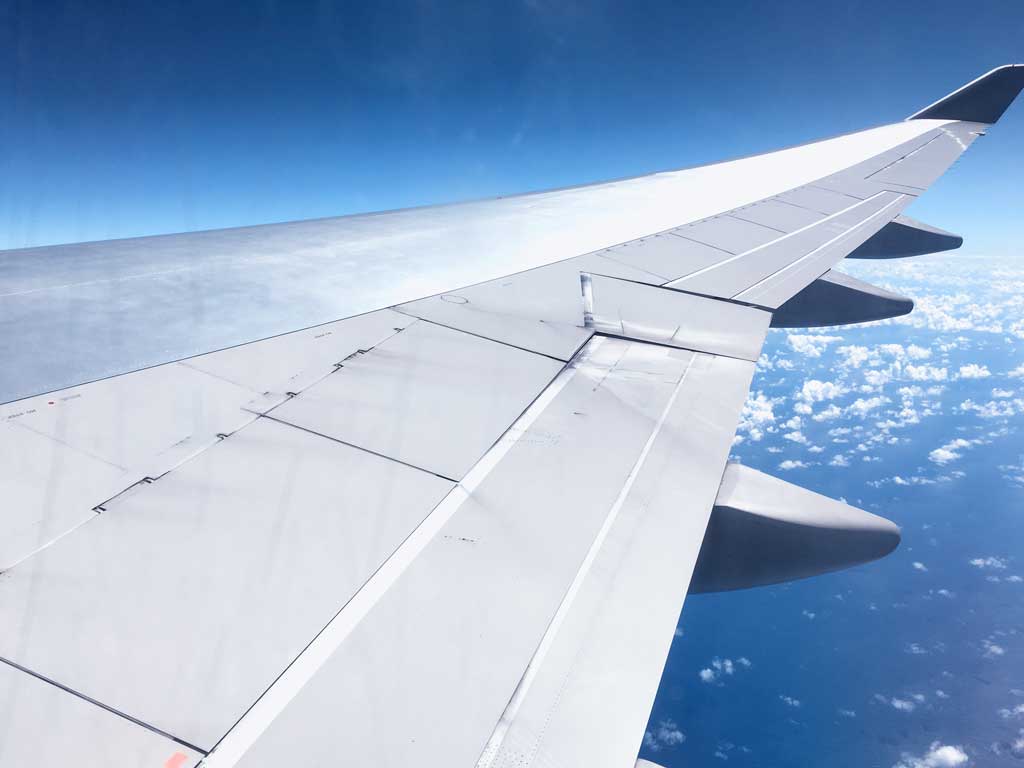
For any long-distance flights, comfort is important.
We were originally going to travel to Europe in 2016, but I was made redundant in May of that year and didn’t get another job until September (which was when we were going to go on holidays). The only thing we’d booked before May were the plane flights. And we didn’t have travel insurance, because why would you take out travel insurance six months before you were planning on leaving?
So we lost some money on cancelling the flights. And I discovered that around two months before we were going to go away, the flights were actually cheaper than when we’d booked them months earlier.
So I decided there was no major benefit in booking flights early.
It’s important to consider that both our holidays were to major destinations in Europe and the US – places that the major airlines fly to multiple times a day. So I wasn’t too fussed about missing out on flights because I knew there’d always be options.
I look at flights a number of times when planning a holiday.
At the start, when I’m working out where to go, I look at what airlines will get me there. If there are internal trips, I look at whether a plane or a train is best. For example, in France, we flew from Caen to Lyon because, based on the distance, this was the best way to get halfway across France. But we caught a train from Geneva to Frankfurt, because it was a nicer and more convenient way to get into Germany.
I have three rules when it comes to booking flights.
First, I stay away from budget airlines for long-distance travel. If I’m going to be on a plane for 14 hours I want it to be pleasant. This means the flight I pick may not be the cheapest, but it’s all about value.
Second, no early flights with teenagers. It doesn’t work. And by early, I don’t just mean 6 am redeye flights. Even an 8 am flight can be a challenge if you need to get to the airport 90-120 minutes beforehand.
For our last trip, we left Adelaide just after midday to fly to Sydney before connecting with our flight to San Francisco. There was no stress, no rush, and everyone was awake and not tired and grumpy.
Which brings me to my third point around booking flights – make sure any airport transfers are realistic. You do not want to be rushing around in an unfamiliar airport with a tight timeframe to get through customs and onto your international flight.
This is made worse if you’re booking one flight with one airline and your next flight with another. You’ll need to get your luggage off the carousel, check it in with the new airline, go through security again and then customs and immigration.
Be aware of the layout of the different airports. We flew with Qantas and at Sydney airport, the International and Domestic terminals are on opposite sides of the airport connected by a shuttle bus. We made sure we had enough time to disembark our first flight, walk to where the shuttle leaves, wait for the shuttle to arrive, travel across the airport and go through customs and immigration. You need a couple of hours to do this with minimal stress.
Budgeting for a holiday with teens
I’ll write a separate article on this but for now, be aware that any holiday with teens will cost a bit.
Most airlines and tourist attractions have the view that once you’re older than 12, you should pay adult rates. Some are generous and have student concessions, but not every place will do this.
The big expenses for our holidays were flights and accommodation.
Travelling to Europe or the US from Australia is expensive, especially when there are four people all paying full fares. Yes, you can get some cheap flight deals, but a lot of the time the dates that we want aren’t available.
We paid around $2,000 per person for flights for both the Europe trip and also our US holiday. Add to this the cost of trains and internal flights and you’re up to $10,000 for the trip.
When it comes to accommodation, we usually use Air BnB’s. We prefer to have separate bedrooms on our holidays – one for the adults and one for the kids as well as a common space like a lounge room. Also, we look for somewhere with kitchen facilities so we can save money by having breakfast in the morning before we go out. This also reduces the morning rush because we’re not making our kids get ready at an earlier time to get to a hotel restaurant for breakfast.
Every Air BnB we’ve stayed at has had more space than a hotel room in the same area. This extra space is so important when you’re on the road together for 3-4 weeks. You need enough space so you’re not all over each other.
Overall, we found the Air BnB’s to be cheaper than a hotel room. Yes, you can always get budget hotel rooms, but when we’ve considered the room costs, savings on breakfast and other meals from having our own kitchen and the location, the Air BnB’s win out.
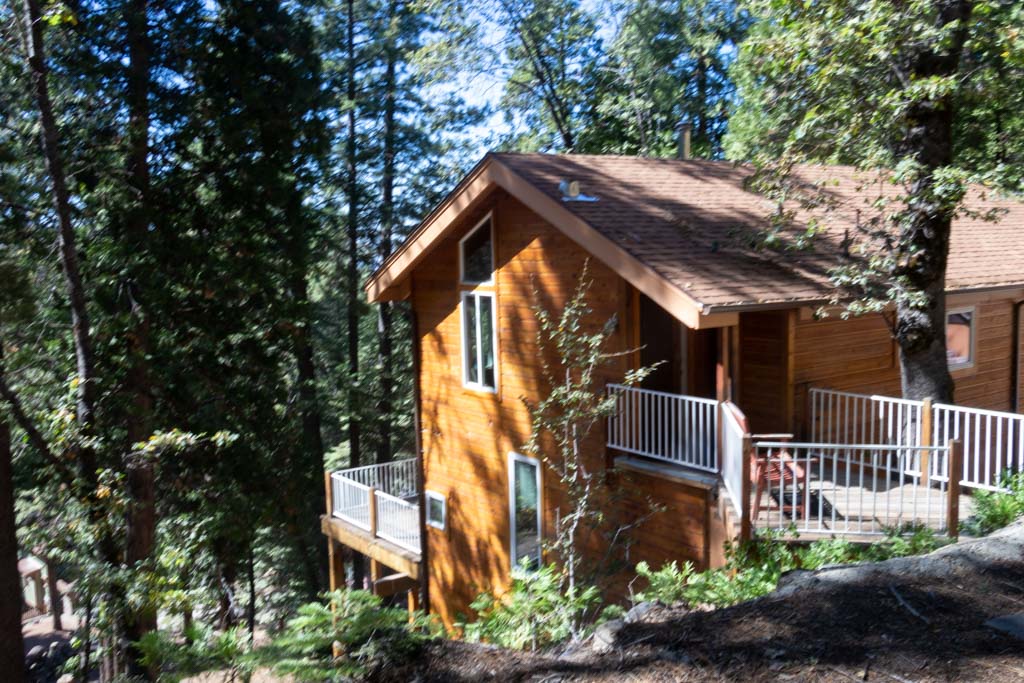
Our Air BnB in West Yosemite
Once you’ve estimated the costs of your flights and accommodation, you’re well on the way to working out the cost of your holiday.
We added a figure of around $180 per day to cover food and other general costs. This was usually a sandwich lunch and a sit-down dinner.
Think about the sights you want to see and how much they’ll cost. Add this to the list.
Will you hire a car? What will that cost? What about public transport? We try and use public transport in whatever city we’re in and will look for weekly passes.
Once you’ve estimated the costs, it’s time to add it all up and then work out how you’ll save for the holiday. If you estimate your holiday will cost $24,000 and you want to go in 12 months time, then it’s a simple thing to divide $24,000 by 12 and arrive at a figure of $2,000 per month that you need to save.
If that’s achievable, then set up the savings plan and start planning your holiday.
If it’s not achievable, then you have a couple of options. Either defer the date of the holiday (i.e. instead of twelve months is it an option to do it in 18 months) or reduce the cost.
Remember, there’s no right or wrong when it comes to how much a family holiday should cost. Whilst part of me would prefer to take that money and reduce our debt, another part of me realises that we only get the chance to have these experiences with our kids for a short period of time.
When You’re There
When you’re actually on your holiday, try not to be stressed. Enjoy the moment.
Even though I’ll have things that I want to do each day, I’ve learnt to not rush too much or try and pack too much in.
I think we were better with this on our second holiday than our first.
There are some mornings that you need to get out early to arrive somewhere before the queues start. Your teenagers may not be as keen as you are to get started. If every day is like this, then you’re going to run into problems. But if it’s only for a few days, they’ll come to the party and get ready in time.
We’d usually spend some time each night explaining what we were planning on doing the next day and we’d let our kids know what the important things were – i.e. time we were planning on leaving, when we’d get back, places we were going to visit.
We’ve learnt to allocate some downtime – it gets tiring being on holiday! Seriously, you do a lot of walking and are on the go for long periods of time and, while it’s exciting to be in a new city, sometimes a quiet night or afternoon back in your accommodation will be just what you (and your teenagers) need.
On every trip, I have a list of must-dos and good-to-dos. We make sure that we tick off the must-do’s – things like the Louvre in Paris or the Empire State Building in New York. We’re not as fussed about the good-to-dos. If we’re in the area and have time, we’ll do them. If not, we try not to be too disappointed.
One thing to realise is that you’ll always have unfinished business in each place you go to. You’ll never see everything and that’s why you need to go back someday!
Be Flexible
You know how I mentioned that my kids seemed a bit disengaged in the planning process? That changed once we were there.
When we were in a city, they saw things they wanted to do and places they wanted to see. And sneaker shops they needed to go into. Constantly.
But that’s a good thing. Don’t fight it. Be flexible in your scheduling so you have the time to do extra things. They may turn out to be some of the best holiday memories you’ll have.
Get them to help
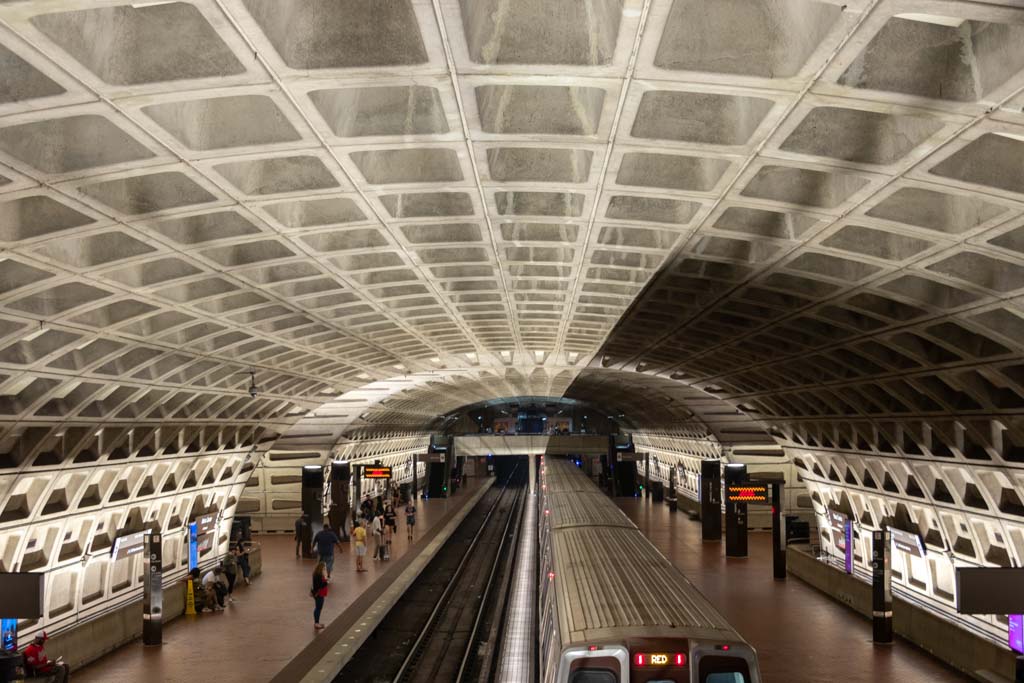
Get your kids to learn how to navigate the local public transport. This is the subway in Washington – it was so easy to get around town.
After the first couple of days on holiday, I get sick of being the one responsible for using Google Maps or the CityMapper app to work out how to get around.
On our last holiday, I got our kids more involved and would get them to work out the directions. I found it gave them a greater appreciation of the things we would normally do for them, and it forced them to pay attention and learn about the local public transport system.
It gave my kids the confidence to use the subway by themselves in New York. And face it, if you can figure out the New York subway, you’ll be okay with most subways around the world.
I’m also mindful that my kids aren’t too far away from being the age where they’ll be able to travel independently and will find themselves in strange cities with public transport they’ll need to figure out.
You’re actually doing them a favour when you ask them to help with things like this.
Meals on vacation with teenagers

Eating out with teenagers can be expensive!
We usually stay in AirBnB’s that have kitchens – this helps to keep the costs down.
We almost always have breakfast at our accommodation. On our first day somewhere we’ll head to the supermarket and buy some breakfast cereal for our family. Our kids love this as they’re able to buy cereal that they can’t get in Australia.
A few boxes of cereal are much cheaper than going out for breakfast. Plus, it means you don’t need to rush out earlier, because you’re eating in your room.
For lunch, it depends on what we’re doing.
Sometimes, if we’re out for the day, we give our kids a fixed amount of money to cover their lunch and snacks. If they want to buy a basic sandwich for lunch (or better still, the Tesco $5 meal deal), then they’ll have other money left over for other snacks.
For dinner, on our last trip, we ended up doing two different things.
Some nights, we’d head to our local supermarket and buy some frozen meals or things like pasta or pre-made salads. This was always much cheaper than going to a restaurant and, if we were having the night in, was a lot more relaxing. Plus, one of our sons discovered that hot pockets are really nice.
If we’re out, we’ll work out where to go for dinner.
Pre-trip, I make a list of restaurants that people have suggested from places like Tripadvisor etc. If there’s one near where we’ll be for the evening, we’ll sometimes head there.
Other times, we’ll use Google Maps to see what meal options are nearby. We’ve found a number of good restaurants this way. This is also something you can get your teenagers involved in – ask them to look on Google Maps and find somewhere to eat.
We have a food budget of $AUD200 per day. Some days we spend more than this, other days less. It tends to even out over the course of our holiday.
It’s good to explain to your kids that you have a budget. It shows them that there are costs involved in everything and you don’t have an endless supply of money. It is also good because it helps them understand the trade-offs that exist in any budget – if we spend more on food, we have less to spend on other things.
On our last trip, we ate in a lot more than our previous trip. And funnily enough, our kids enjoyed it. It was a good reminder that on any holiday you need some downtime and sometimes the evenings are the best place for that.
Luggage with Teenagers
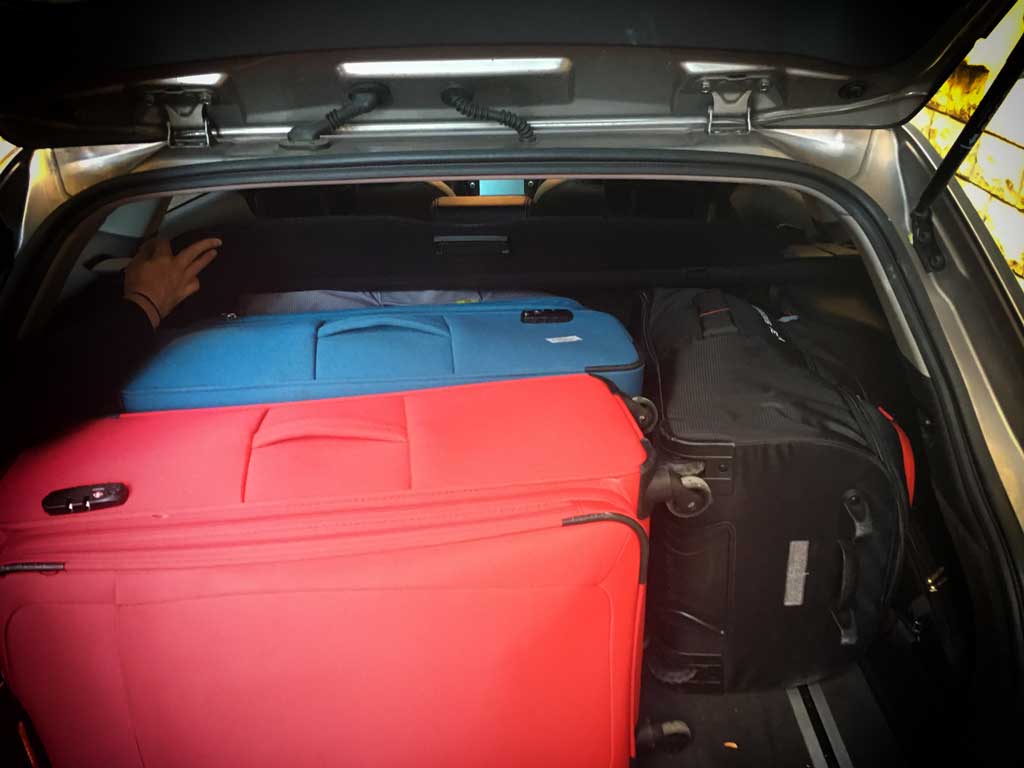
Luggage with teenagers – try not to pack too much!
If you bring it, you carry it.
That’s our rule. Our teenagers are old enough to pack their own bags and be responsible for what they bring.
When we’re flying, they’re responsible for their own carry-on. If they want to bring their laptops with them, that’s fine, they just need to carry them.
When we’re out exploring, we expect them to bring their own backpack so they have somewhere for their water bottle, jacket etc. We don’t carry this stuff for them.
And when you’re travelling on trains, get your kids to help with stowing the luggage. It’s not that difficult and it’s a simple way they can help.
Also, consider what modes of transport you’ll be using. Your luggage needs to fit in whatever you’re travelling in. This is particularly important when hiring cars – make sure there’s enough boot space for everyone’s luggage.
Have Fun

Have fun on your holiday. I tried some light painting with my son when we were in San Francisco. Long exposure + iPhone torch. What could go wrong?
Remember, it’s all about making beautiful holiday memories.
You’ll get stressed, have times where you hate each other, you’ll be tired, hungry and long for your own bed, but at the end of it all, you and your kids will have some amazing memories for the rest of your lives.
Don’t be so stressed about seeing everything that you can’t enjoy being together.
I loved watching our kids in places like London and Paris because they were so different from what they were used to. It was so satisfying as a parent watching them learning about the world and experiencing new things. And I was so proud of the way they stepped up to the challenge of travelling.
We can laugh about the times we were stressed on holiday, but the majority of my kid’s memories are of all the cool things we did and the places they saw.
You’ll never get these moments with your kids again. Cherish your holidays with them, enjoy their company and make some great memories.
Download your FREE report - 5 Money Mistakes You Don't Realise You're Making
These money mistakes are costing you money and you probably don't even know you're making them.

0 Comments
Trackbacks/Pingbacks